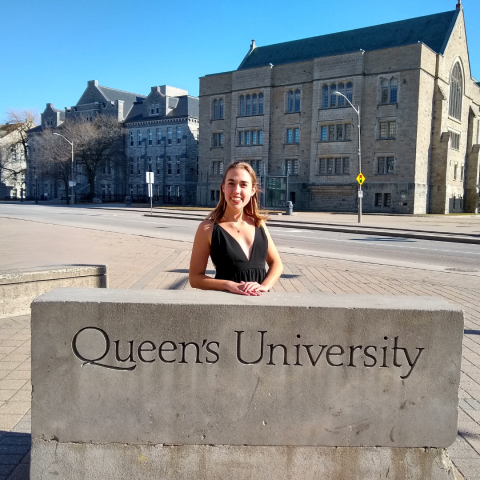
Jessica Izard, Law’23, is the recipient of the 2023 Alexander Fraser Laidlaw Fellowship, which is jointly presented by Co-operatives and Mutuals Canada (CMC) and the Co-operative Housing Federation Canada (CHF Canada).
Izard’s research into worker cooperatives as a solution to some of the legal problems that typically are involved in family farm succession planning has earned the Victoria, BC, resident this honour, which carries with it a $1,000 cash award.
“My involvement with the Queen’s Elder Law Clinic (QELC) sparked my interest in this topic,” she says.
“At the Clinic, I helped seniors prepare their wills. I found they cared deeply about the continuation of their values and providing for their loved ones, and it was our candid conversations about how they wanted their legacies to live on that humanized the succession planning process for me.”
Izard especially recalls one client who showed her deeds from the farm his family owned since the 1930s. This man’s story piqued her curiosity about ways in which farm families might perpetuate their values and concerns if changing circumstances oblige them to sell their land. She expressed her curiosity about the topic to Professor Gail Henderson, who has worked on community economic development. Henderson suggested that worker cooperatives could be a possible solution for family farm succession planning, and she offered to support Izard in investigating the legal aspects of the possibility by supervising her research project.
What Izard learned is that a worker cooperative is a business structure that’s collectively owned by its workers, and democratically governed on a one-member, one-vote basis. She explains that because worker cooperatives are guided by a defined set of values and principles, the structure presents a good alternative to a family successor for retiring farmers who prioritize values and community in their succession planning.
During her exploration of the law in this area, Izard consulted with contacts at the Canadian Worker Co-operative Federation. It was the staff there who alerted her to the existence of the Alexander Fraser Laidlaw Fellowship and urged her to apply. The award commemorates the memory of Alexander Fraser Laidlaw, the father of the non-profit cooperative housing movement in Canada. Laidlaw, who was an adult educator, author, and co-op leader, served the cause of the cooperative movement for more than 40 years.
“As part of my fellowship I’ll be sharing the findings of my research on succession planning for family farms at the CMC-CHF Canada annual conference next June,” Izard says.
In the meantime, she’s busy articling with the Victoria firm Cook Roberts LLP and making long-term plans for her legal career.
“My favorite aspect of practice is getting to know client stories so I’d love to continue building a focus on family-run business, but my mind is completely open to other possibilities as well,” says Izard.
By Ken Cuthbertson, Law’83